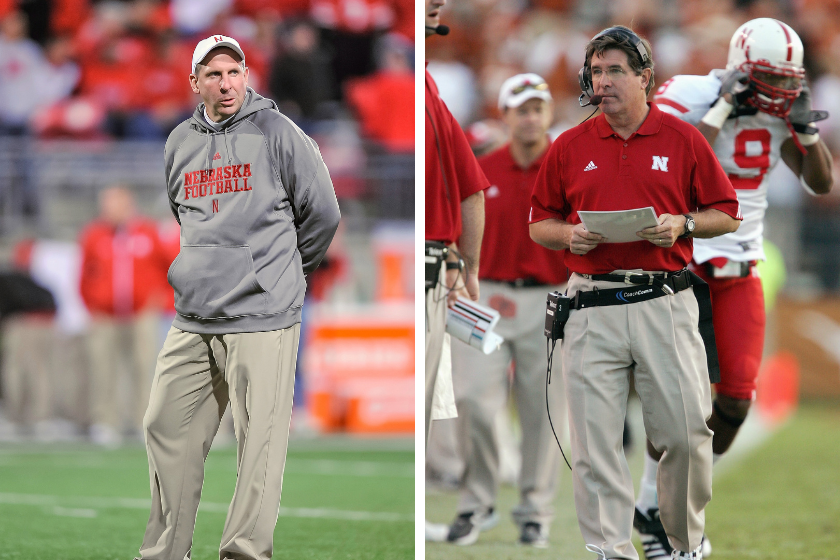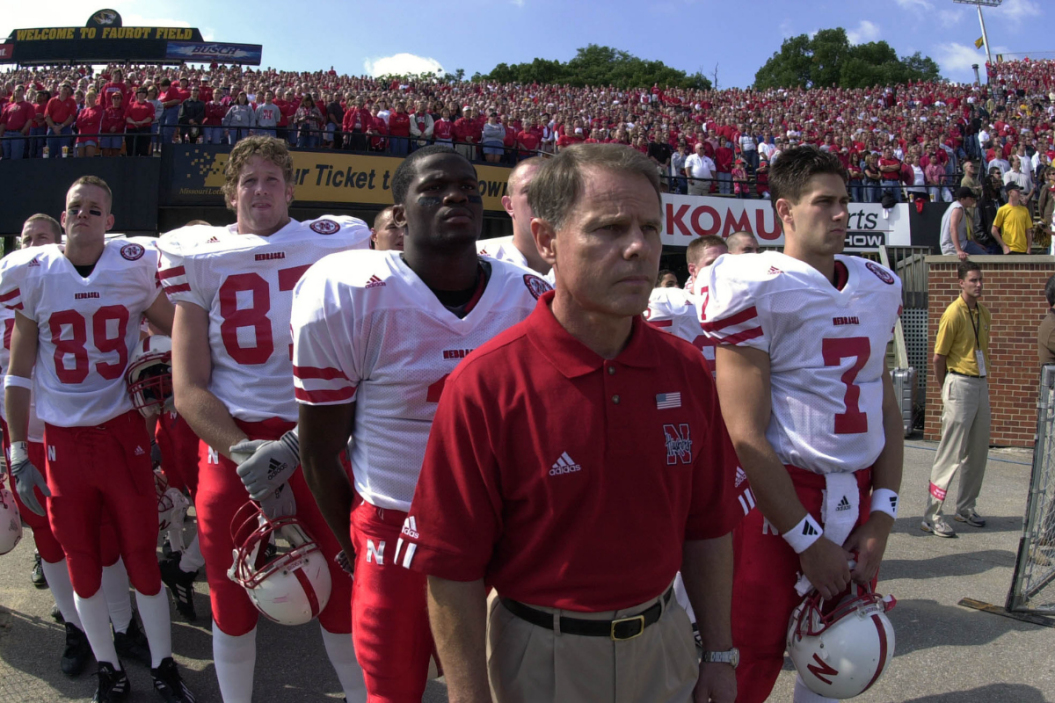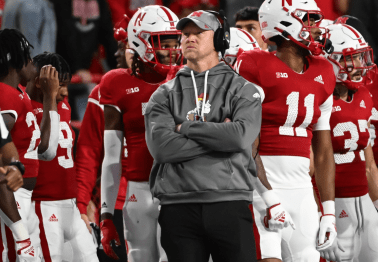As a Nebraska fan, rock bottom is redefined for me every fall. It can't get any worse than losing to BYU on a hail mary? Northern Illinois? Troy? Wisconsin by 39 in the Big Ten Championship? How about having Michigan State, Michigan and Ohio State on the ropes and shooting ourselves in the foot? How about a special teams unit that makes you believe your high school's JV kicker could do a better job because he can consistently make extra points? How about coaches who are allergic to the simple, most logical, obvious decisions?
As the great Billy Beane in "Moneyball" once asked: "Would you rather have a bullet to the head or five to the chest and bleed to death?" I've had 1,000 bullets to the chest over the past 20 years, and I'm getting the bare minimum blood transfusions to keep the torture going.
I talk this way because there's no team I care about more than the Nebraska Cornhuskers. I want to see this team win more than anything, but my soul is crushed each time I get an ounce of optimism.
Hindsight makes it easy to look back and see how things could've been different, but for Nebraska football, the program's downfall started when athletic director Bill Byrne left for Texas A&M in 2002, Steve Pederson was hired to replace him and Frank Solich got fired.
I can speak for all Nebraska fans when I say we've never thought about this before, but what if Byrne nor Solich had left Lincoln?
What if Nebraska Hadn't Fired Frank Solich in 2003?

Stephen Dunn via Getty Images
RELATED: Joe Burrow's Brothers Starred on the Gridiron Before He Did
Nebraska head coach Tom Osborne called it quits after winning his third national championship in 1997 and spending 25 years leading the Cornhusker football program. He named Solich, who played at Nebraska and was one of his top assistants, his successor.
Solich kept the momentum going to round out the 90s, winning a Big 12 championship in 1999, and carried it into the new millennium. His 2001 team was quarterbacked by Heisman Trophy winner Eric Crouch and controversially made the national championship game against an all-time Miami squad.
The dropoff began in 2002. Byrne, who started at Nebraska in 1992 and led the athletic department during the heyday of the 90s, left to become the AD at Texas A&M. Solich went 7-7 and his public support started to diminish. Following a "heinous" 9-3 record in 2003, new athletic director Steve Pederson, who thought his shit didn't stink, decided to give Solich the boot in his first year on the job. Defensive coordinator Bo Pelini served as the interim head coach in the Alamo Bowl victory against Michigan State.
At the time, 16 wins in two seasons were enough to get you crucified, but keep in mind Solich had 58 wins through his first six seasons, which was more than both Osborne and legendary head coach Bob Devaney had in their first six campaigns, respectively.
Why was he fired then? Like I said, Solich's public support was shrinking, the product on the field wasn't what it once was and a "down" 9-3 season were enough reasons to cut ties. Pederson saw this as an opportunity to hire a high-profile name like Steve Spurrier, Urban Meyer, Nick Saban or Houston Nutt even though none of them showed the interest he indicated. The simple, logical, most obvious choice I mentioned earlier also applies to Pederson's athletic department.
Sure, he fired Solich. Did he go with Pelini, an internal up-and-comer who led the nation's third-ranked defense and coached the team to a bowl game win, after he exhausted his insane wish list? That would've been ballsy because Pelini had only spent one year on the staff and had no head coaching experience. Did he go with another prominent college coach then? Why on Earth would he do that? Instead, he went with recently fired Oakland Raiders head coach Bill Callahan, whose West Coast offense fit seamlessly with Nebraska's run-first identity of the past 30 years.
I've undergone extensive treatment to have the Callahan era removed from my memory. I couldn't rehash it if I tried.
However, what if Pederson hired Pelini in 2003? Would the once-storied college football program look any different today?
What if Nebraska Hired Bo Pelini Instead of Bill Callahan?

Jamie Sabau via Getty Images (left), Brian Bahr/Getty Images (right)
It would've been a huge risk for Pederson to go with Pelini. Like I mentioned, he had only spent one year on the staff and had no head coaching experience other than the Alamo Bowl. Nebraska had enough clout at the time to attract a bigger name. However, there was precedent for an assistant being called up to take the big job. Osborne served as Devaney's offensive coordinator until he took over in 1973. Solich was the running backs coach before Osbonre made him his successor.
It's understandable Pederson decided to go in a different direction seeing how Solich's tenure went, but anybody, literally anybody with college football head coaching experience would've been a better option than Callahan. Sure, Pelini was the opposite of that by being young and inexperienced, but the players loved him and played hard in the Alamo Bowl.
Would it have been so terrible for Pederson to go with him after striking out on his impossible short list? It couldn't have been worse than Callahan.
Pelini went to be the defensive coordinator at Oklahoma and LSU after being nixed by Nebraska. His defensive scheme helped the Tigers win a national championship in 2007. Pederson was let go in the middle of the '07 campaign and Osborne was brought in to be the interim athletic director. His job was essentially to make amends with Pelini and bring him back to Lincoln, which he did in 2008.
So, Pelini did get eventually get his shot at Nebraska. He never saw fewer than nine wins in his seven-year tenure, but he was fired in 2014. I can't say how Pelini's Nebraska career would've turned out had he been hired after Solich was let go, but he was an option I'm sure Pederson never considered. However, I can say Nebraska football has seen its darkest years since 2003. Callahan, the "hip-hip-hooray" Mike Riley years that make me want to eat glass, the ongoing, "Dear lord, what else can go wrong" failure of prodigal son Scott Frost — the frustrations haven't subsided.
I'm a believer in karma when it comes to sports, and when you make the decision of going with Callahan over anyone else, let alone someone with potential who was right in front of you the whole time, karma will come back to bite you as it has over and over again.
Would Nebraska still be as nationally relevant as they were had they hired Pelini in 2003? I doubt it, but I'm confident we wouldn't have sunk as low as we have, and I could see us being a Wisconsin-type program. High floor, respectable ceiling and a brand of football that makes fans proud. Plus, Pelini's players during his time in Lincoln still speak highly of him to this day.
Kenny Bell with quote of the year: "I would play for Bo Pelini against Satan himself and a team of demons at the gates of the underworld."
— Robin Washut (@RobinWashut) November 29, 2013
Yes he had flaws, but he was doing something right in the locker room. Maybe he could've figured out his fatal flaw of choking in big games by being thrown to the wolves early on in his career.
And look, Pelini's not a Saban, Meyer, Jim Harbaugh or Paul Chryst and butted heads with an administration that hated how he presented the University. But, what did you expect when hiring him? A calm, cool and collected guy who says "shucks" and will sit quietly when he disagrees with a call against his team? That, my friends, would be Mike Riley, who coincidentally was brought in to replace Pelini in 2015.
At the very least, Pelini won the games he was supposed to win and lost the games he was supposed to lose. Seeing how things have gone the past two decades, and the time since he was let go particularly, Nebraska fans would kill for merely making a bowl game.

